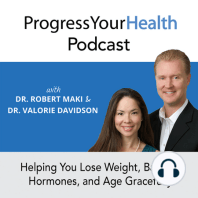1 min listen

What Type of PCOS Do I Have? Concealed | PYHP 065
What Type of PCOS Do I Have? Concealed | PYHP 065
ratings:
Released:
Sep 27, 2019
Format:
Podcast episode
Description
In this episode, we are going to continue talking about the Types of PCOS that we have seen. As we have said, (repetitively) PCOS is not a one size fits all. There are some women that have most of the symptoms to just a few. We have three types that we have seen in treating patients since 2004. It is important to have this distinction when it comes to health goals and treatment plans. Doctors that routinely treat PCOS will tell you there are different types. They might have their types that they have seen. But in our experience, these are three types that we have seen most regularly.
The three types of PCOS
Classic
Common
Concealed
Concealed: This type of PCOS is never picked up on. These are the women that have gone to many doctors looking for answers. This is because they have just a small few of the symptoms but not enough to point to PCOS. But they do have a hormone imbalance, and when you break it down, it is a type of PCOS. It seems to get worse when a Concealed Type hits perimenopause or late 30's to early 40’s. The female hormones are changing, and the body cannot maintain.
This is typically what you will see in the Concealed-Type:
May have a child, so it looks like there are no fertility issues
Really irritable–all the time, and way worse before their period
Yes, they have regular periods but the worst PMS
Anxiety –it seems that they have a lot of low-grade anxiety all the time.
Hair is thin
Slender until they hit mid to late 30's to early 40’s. This is when they gain weight, especially in the stomach. No matter what they do, they cannot lose weight. Even with severe caloric restriction and lots of crazy exercise, there is no real budge to the weight.
Carbohydrate cravings especially for sugar
All these symptoms of the Concealed are blown off as genetics or lifestyle. I have had so many patients with Concealed PCOS say that their previous doctors did not believe that they had a healthy lifestyle.
This is what their blood work typically looks like:
LH : FSH ratio : the LH is higher than the FSH just a little. There is no 2:1 ratio like you see in the Classic-Types.
High normal testosterone or just over the edge of normal testosterone. Let me explain again those ridiculous reference ranges for testosterone blood labs. Most labs have the reference range for testosterone to be 2-45, which is a very wide range. Those with Concealed PCOS will have a testosterone at 35-55. The average levels of testosterone for women regardless of age or menstrual status is about 25, so the Concealed are higher than the average.
Low progesterone
High normal DHEA-sulfate
Lower thyroid function but not hypothyroid
Low normal FreeT3
Normal FreeT4
Normal TSH
If you would like more information, visit our website: pro
The three types of PCOS
Classic
Common
Concealed
Concealed: This type of PCOS is never picked up on. These are the women that have gone to many doctors looking for answers. This is because they have just a small few of the symptoms but not enough to point to PCOS. But they do have a hormone imbalance, and when you break it down, it is a type of PCOS. It seems to get worse when a Concealed Type hits perimenopause or late 30's to early 40’s. The female hormones are changing, and the body cannot maintain.
This is typically what you will see in the Concealed-Type:
May have a child, so it looks like there are no fertility issues
Really irritable–all the time, and way worse before their period
Yes, they have regular periods but the worst PMS
Anxiety –it seems that they have a lot of low-grade anxiety all the time.
Hair is thin
Slender until they hit mid to late 30's to early 40’s. This is when they gain weight, especially in the stomach. No matter what they do, they cannot lose weight. Even with severe caloric restriction and lots of crazy exercise, there is no real budge to the weight.
Carbohydrate cravings especially for sugar
All these symptoms of the Concealed are blown off as genetics or lifestyle. I have had so many patients with Concealed PCOS say that their previous doctors did not believe that they had a healthy lifestyle.
This is what their blood work typically looks like:
LH : FSH ratio : the LH is higher than the FSH just a little. There is no 2:1 ratio like you see in the Classic-Types.
High normal testosterone or just over the edge of normal testosterone. Let me explain again those ridiculous reference ranges for testosterone blood labs. Most labs have the reference range for testosterone to be 2-45, which is a very wide range. Those with Concealed PCOS will have a testosterone at 35-55. The average levels of testosterone for women regardless of age or menstrual status is about 25, so the Concealed are higher than the average.
Low progesterone
High normal DHEA-sulfate
Lower thyroid function but not hypothyroid
Low normal FreeT3
Normal FreeT4
Normal TSH
If you would like more information, visit our website: pro
Released:
Sep 27, 2019
Format:
Podcast episode
Titles in the series (100)
Familial Adenomatous Polyposis – A Genetic Miracle Case Study | PYHP 10: Familial Adenomatous Polyposis Familial Adenomatous Polyposis, which is abbreviated to FAP, is a genetic condition resulting in a mutation to the Adenomatous Polyposis Coli (APC) gene. The APC is a tumor suppressor gene located on the 5th chromosome. Mut by Progress Your Health Podcast